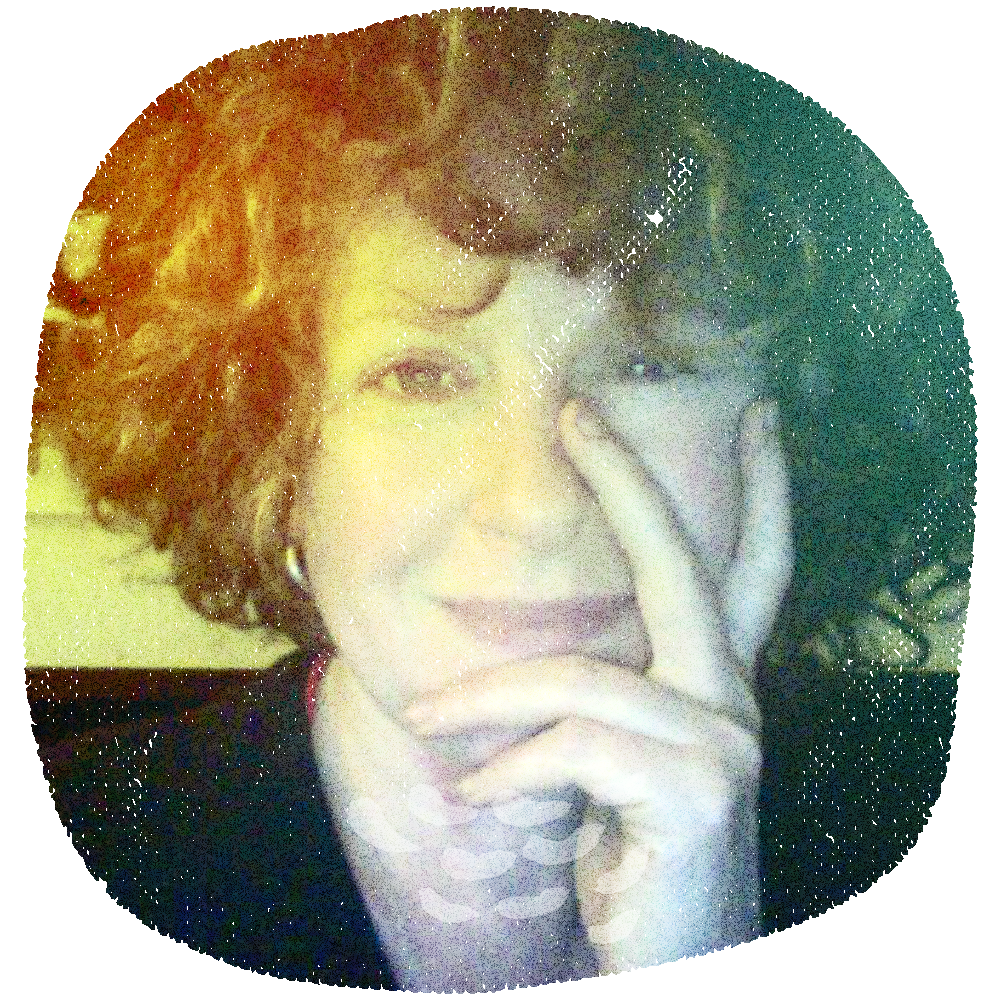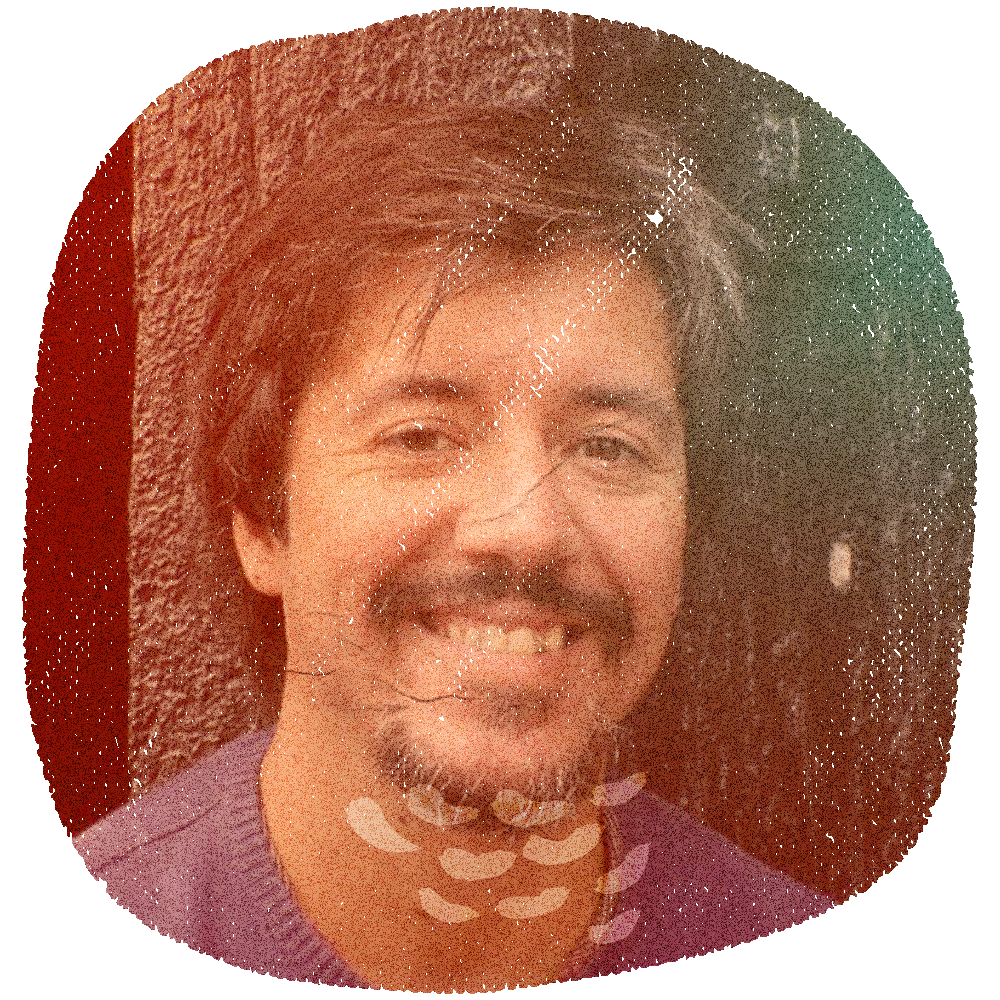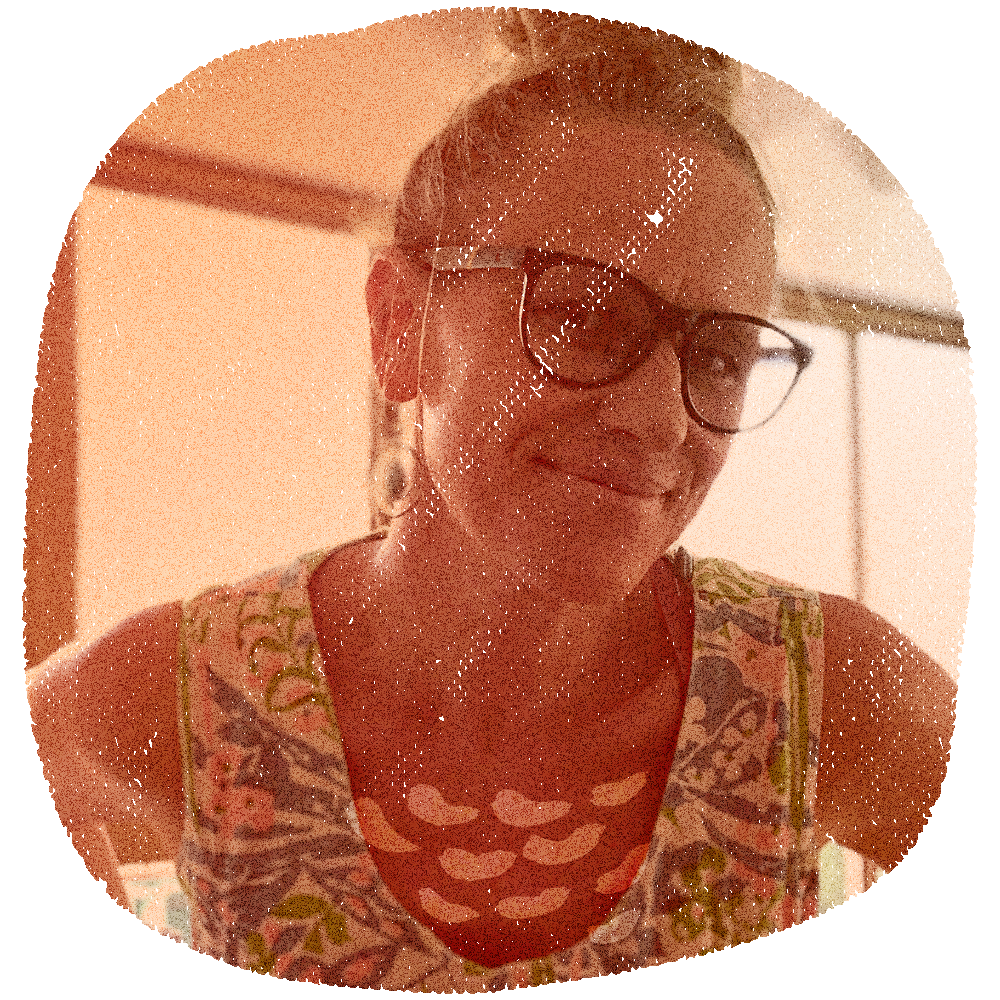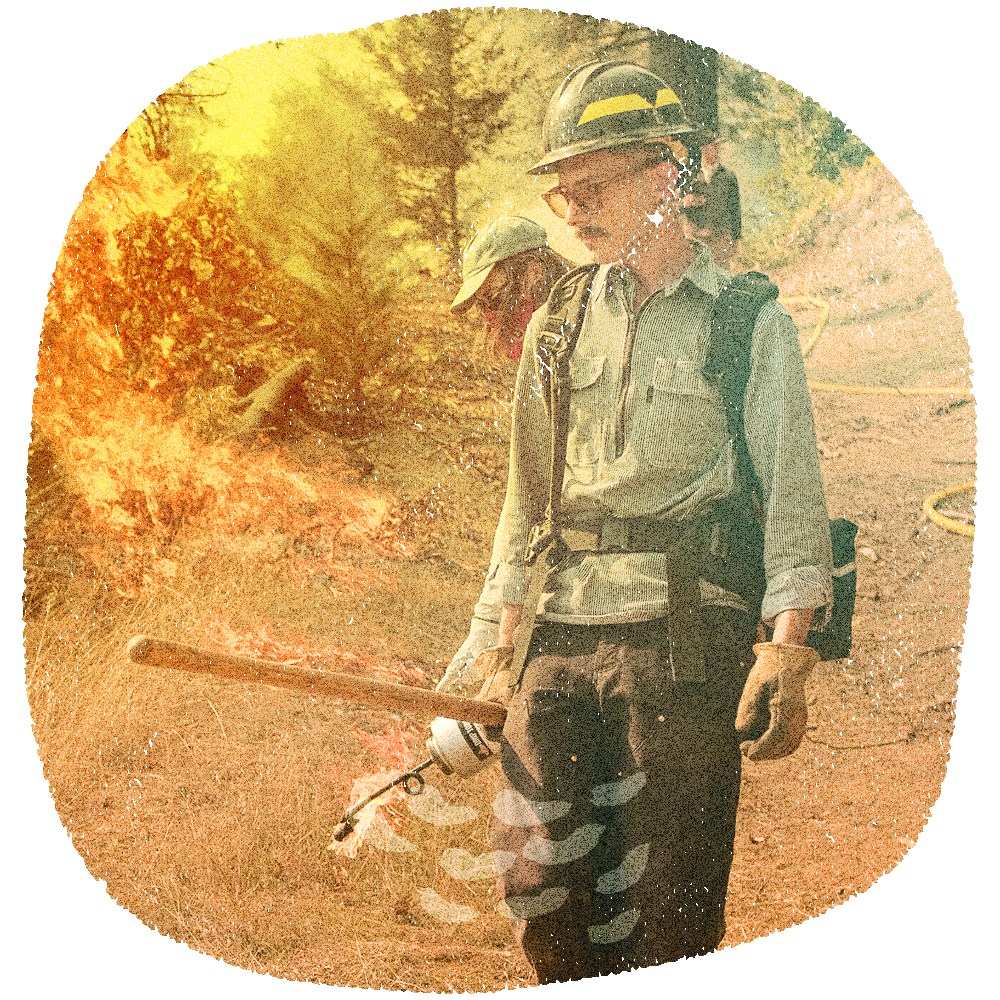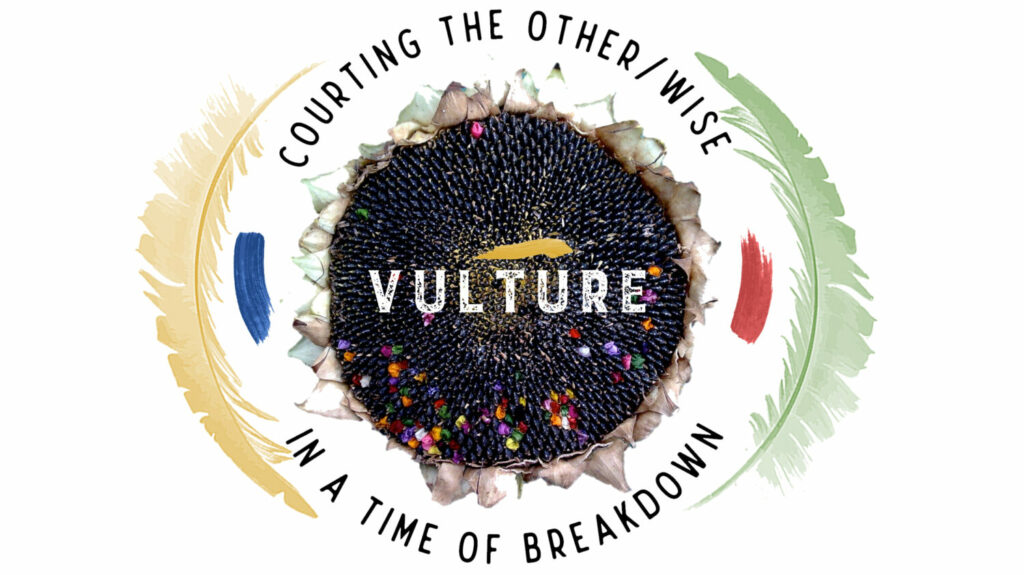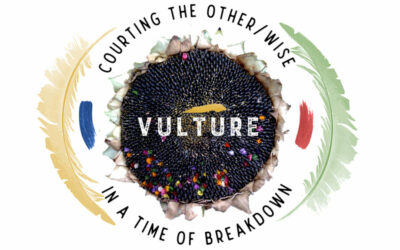
Vulture Harvest: The Slow Conversation
A written dialogue between Toni Spencer, Nuno Da Silva and Báyò Akómoláfé, over the course of three days. This thread opened the The Art of Slow Module of Vulture: Courting the Other/wise in a Time of Breakdown.
Toni:
When we started dreaming this course and putting it into words, this came through:
It has become increasingly hard for people to ignore that we are moving through cultural, social and ecological crises… Through all of this, we are told to trust that the future will be better – and that it will be self-defeating to entertain feelings of hopelessness. We are encouraged to notice the brilliance of our technologies and the confidence of our epistemologies in the stern face of an increasingly irregular planet.
However, our confidence has met something greater. Our older road-maps no longer work, and the terrain does not respond to our steps like before. Everything has changed. The monster that now stands before us will not be circumvented… We sense that we often reproduce our problems in an effort to solve them.
Our thesis is that when we slow down, we notice the world differently: we develop new capabilities and response-abilities that might help wiser bodies/systems to emerge. We re-member our intradependence…
Why slow? In what way is it courting the otherwise? Why slow in the context of our world today… in relation to the otherwise?
***
Nuno:
It took me four years living in south east Asia, in a remote island called Timor, between Australia and Indonesia, to notice the extension of the troubles I was being faced with as someone growing up in the western world embedded with the narratives of growth and development and the promises of modernity. The places inhabit us as much as we inhabit them. Being in the tropics, just like previously wandering in deserts, climbing mountains or hiking in the vast landscapes of Patagonia or Atacama Desert in northern Chile, brought to me that sensuous invitation to slow down and meet time in a different way. It brought me an understanding of the depth of time as much as it’s relativity. The more present I was to the moment, the more that moment expanded; and the more I rushed to do things, the more time would escape fastly through my hands.
Starting to deep-dive enlarged even more that perception as I moved from seeking and searching big fish and spending the air in my oxygen tank really fast, to slowing down my breath and allowing myself to rest upon a coral reef only to discover the immensity present in the small scale of things and how much life is contained there and how much I could learn from it about ocean life.
In a time focused on quick fixes and rapid solutions, especially in the corporate and development worlds – filled with consultants from western world or filled with its dominant narratives and practices that come into the developing countries with prescriptions of what development should be – I started to feel paralysed by coming to embrace not knowing, to start to have more doubts and questions than answers. And so I failed completely as a world bank consultant and started a different path, trying to look into the eye of the hurricane with an open mind and open heart.
I’ve come to notice that slowing down and coming into presence without an agenda opened up a field of possibilities in many situations I engaged with. I started to realize that for something to change, to move forward, it wasn’t necessary to force my actions upon it – which is the current dominant practice of change-making, a somehow patriarchal approach. I started to practice deep observation, allowing dynamics, patterns, tensions and stuckness to be seen and understood and at the same time, de-centering myself and finding inspiration and clues in the otherwise all around me. That brought me into an enlivened relationship with the world around me and a collapse of many previously well established boundaries between myself and the world around me. It was my entry to entanglements and inter-being.
Could it be that the acceleration that we are all feeling around in the world, is in itself an invitation to slow down and discover the fields of possibilities that lay in the silences and empty spaces in between?
***
Toni:
I’m enjoying this already – learning new things about you, Nuno! I remember how the first conversations we had were about doing a course for ten called ‘The Art of Slow’. I’m trying to think, having read your story, where my relationship with Slow began. There are so many facets to how it lives in me and my relationship to the work we’re doing.
I think it began with the enforced slow of what is commonly called Depression. A ‘mental health crisis’. The insistence of something I couldn’t yet hear that flattened me, stopped me, would allow nothing but a slowing down. Something ‘other’ wanted my attention and created a break in the patterns of success, busyness, identity and progress that I was embedded in. A slow power that awkwardly guided me to get on the inside of things. I too left a more conventional career and entered the world of environmental and social change. For a while this enforced slowing down, this breaking down of habits, patterns, limits to my world view. It happened every seven years, like – haha – clock work! A numerical, cyclical, nice neat narrative for a kind of wildness that took me off track and into this more feral terrain where vultures are revered for their beauty.
Over the years so many things added to this inner teaching, including being gifted Manfred MaxNeef’s book Human Scale Development where ‘Idleness’ is counted as one of nine fundamental human needs. I remember such a thrill at this being named, given such ‘status’ alongside Protection, Subsistence, Belonging and more. Within a footnote he writes:
Although in Judeo-Christian culture, we have been told that ‘idleness is the mother of all vices,’ we strongly believe that it carries many virtues. In fact, Idleness and Creation seem to be inseparable if the former is understood as ‘the state of mind and spirit that is inviting to the muses.’
There are so many ‘shapes’ of slow! Focused, idle, receptive, delicate, emptying, sensing, perceptive, prayerful, discerning, lost, found… More of that perhaps in a later letter.
I want to return to your parting question. You ask: could it be that the acceleration that we are all feeling around in the world, is in itself an invitation to slow down and discover the fields of possibilities that lay in the silences and empty spaces in between?
Yes! This polarity between the urgency and the growing understanding of the need to slow down seems to be intensifying. During the Occupy Camp at St Paul’s in London I would find myself slow walking through the occupation, or slowly sweeping the camp as ways to sense the field and to let the otherwise lead. At the launch of Extinction Rebellion in Parliament Square I found myself doing something similar, moving to the edges of the crowd and leaning in, resting back, curious what wanted to happen from the margins. That’s where ‘the pause’ came from: an experiment in participatory prayer / performance… an invitation to listen for what’s wanting to emerge… cultivating practices of curiosity, receptivity, reverence and renewal.
A curiosity about how to court the otherwise in the midst of action, a kind of matchmaking service perhaps – between modalities, places of power, states of normality (in an activism context) and the otherwise. Again, as I remember moments on the bridge we had ‘taken’, in parliament square, by the river’s edge it was about the POWER of Slow: what it enabled, revealed, allowed. It’s powerful! It holds space for other and it is an entity in itself that breaks things!! Raah!
Ironically since then, my life was the fullest it had been for years. Being on retreat (with teachers or alone in wild places) has been essential to me and it’s been a while. Again, part of living within the more systemic and collective acceleration you mentioned. And so I’ve been challenged to live slow, live ‘the pause’ in even more embodied or strange ways, as an attitude, a possibility, a talisman in the moment…
I carry a piece of the Wadi Araba desert with me (a solid round ball of compressed sand). My breath and body send signals. And a memory of tartan:
When I opened our circle of ‘leaning into the trouble’ on our last Zoom call, I spoke of placing things in the centre on a cloth. This image is rooted in a moment many years ago when I was on retreat. I was expressing an intense busyness, pulled in too many directions, fast and overwhelmed. I was invited to find the opposite as a gesture. I found myself crouched over a tartan blanket slowly smoothing out the creases one by one. Intimately, as if there was nothing else in the world but that movement of hand on wool. The otherwise filled the room and everything changed. I refer to things often (to myself) as ‘tartan blanket’ moments.
Time for me to sleep now. Let my whole metabolism slow down. Leaving with a question for you, Báyò. Tell me something of this tension between the knowing of the power of slow and the living of a very full life? I’m curious about the ways you find to live with this dilemma or see it in the world?
***
Báyò:
I think for me the idea of slowing down is tied up with considerations about the invisibilizing power of modernity. Modernity is this complex arrangement of bodies, human and nonhuman, that basically blinds us to our entanglements with the world around us. It fixes its eye on the ‘individual’, leaving out the stunning processes, conditions, landscapes, flows, materialities, rhythms, conspiracies, turbulences, and movements that make this ‘individual’ possible. In short, the invisible subsidizes the modern. And until we cultivate ways of meeting and with-nessing the invisible, we might keep reproducing the same troubling dynamics we now seek to escape from.
Slowing down then becomes an invitation to gently tend and attend to our complicity within and imbrications with the troubling realities we want to resolve. This is what I think is meant when we say ‘the times are urgent, let us slow down’. It means that our bodies are undergoing a crisis of form, and the costs of maintaining/performing a particular mode of being present on the planet can no longer be sustainably subsidized by so-called ‘externalities’. I think postactivism’s work is to help us investigate our imbrications within the systems of exploitation we rail against – stressing that we think with/in these systems.
What this means for me – to answer your secondary question, Toni (about the tensions between slowing down and living a full life) – is difficult to answer. For one, I am deeply in touch with the radical impossibility of living ‘fully’. We show up partially, often sabotaging ourselves, replete with shadows, and more. We are contingent, transient, often intransigent to the point of self-annihilation. Can I offer gratitude to these wounds – these thorns in the flesh – instead of launching battles against them? It seems unusual to want to be grateful for one’s flaws, but I think that in an entangled and entangling world, even the things that stand in one’s way are part of the way. My writing and journaling are strategies I have adopted to meet my embodiment.
***
Toni:
I’m struggling today. I am, in this moment, familiarly ‘complicit with the troubling realities we want to resolve’. I notice the fluctuation between the feelings of isolation and failure here in my struggles, and a sweeter, softer experience that arises (as I slow down) of love, liberation and solidarity with so many of my fellow humans and our multiple relationships beyond. I want to somehow be more generous with these truths. I had to look up your word ‘imbrication’ and the definition I’m struck by is ‘an overlapping of edges’. I love it. It’s so familiar as an experience in this work we’re doing where multiple realities, fluctuating inner orientations, intersectional troubles all hang out. The image with the online dictionary definition is of neatly overlapping tiles. This feels more like the overlapping scales of an armadillo in transit or the blousy petals of a fat insect filled flower in full bloom. In the act of slowing down, the layers or spaces between and the whole of the moment become available to courtship.
I wanted to write about some of the ‘layers’ of slow, like layers of sediment, but I like this overlapping of edges too:
- The layer that is simply becoming more aware of what is here and now – we can take more in, wake up and be with more: internal sensation, feelings, external movements, visuals, interactions.
- The layer where we begin to merge with it all, no separation, felt experience of oneness. Where we can notice both our differentiation and entanglements, including in the materiality of air, water, flesh, past, present, future, knowings of the curvature of the earth and the sound of hammer on stone in the mine across continents digging for minerals for the phone we’ve just put down.
- And the layer that is an emptying out: a seemingly opposite gesture to the taking more in and yet made possible by it. We notice, welcome it all – we stop excluding – and in that deep democracy comes enough safety and wholeness to empty out, let go of it all, surrender into the ‘dark energy’ of the unknown universe, the mystery within and without.
- And the layer that is empty enough to receive the otherwise. The receptivity of the dark feminine that has been overridden and dismissed and sped through for so many generations.
I feel shy to write this somehow right now – like I’m missing some intellect in the matter – but I want to speak directly and personally to how this has been an oppression and dismissal of blackness too – or a centering of whiteness. A turning point for me – a dojo moment – in learning the Art of Slow was waking up to my dismissal of my brother-in-law and how he would sit on the sofa ‘doing nothing’ for hours on end. For years I judged him for this, for his ‘unproductivity’. Reading, meditating, sleeping would have all been understandable to my colonized mind but what on earth could be going on that he just sat there?
Until I realised that this was his otherwise, his Bété roots. Here he was bringing his African embodiment of slow in a way of such ordinary brilliance. Here he was ‘emptying out’ as he has subsequently told me and also remembering his ancestors. And I so nearly missed that completely. One of those multiple, small, domestic violences, evidence of how alive and well the colonial project still is.
So, if slow is a rebellion against colonialism, patriarchy and the industrial growth system in how it changes our lived experience, how it opens the intimacy of entangled relationship and presence, I want to name again how it is a radical act in itself.
And it no longer feels enough. I’m curious how the experience of those of us exploring these lived practices, potentialities, edges and pleasures of slow (I speak as a white, middle-class English-living person who has identified for a long time as an activist in different forms) can face the questions of those carrying more of the load of it. Or to be more blunt, how do we live it tangibly as an act of solidarity and reparation? How is it not simply a solo experience or one kept for the company of workshops, retreats and easy days?
***
Nuno:
Gratitude for your thoughts, dear Báyò and Toni. As usual, I’m finding myself in trouble, being in written conversation with you two, in your “mother tongue”. Staying with the trouble is in itself an invitation to slow down and inquire close to the cracks where our habitual ways are signaling collapse. Slowing down, just like other movements that we tend to call practices, is a gesture that becomes part of a way of being. According to Lao Tzu, “The way to do, is to be.” Another of his quotes is: “Why do you run looking for the truth? Be still, and there it is – in the mountain, in the pine, in yourself.” Slowing down, can be experienced as a state of aliveness and authentic relatedness. As I slow down and meet the otherwise, I experience a transcendence of boundaries. It really feels like a loss of boundaries with part of the natural world when for a few moments, the otherwise and I are inseparably fused. Actually, the otherwise ceases being one “other” to me in those moments. On few occasions, I’ve experienced encounters with other creatures, like a giant turtle on one of my first dives in Timor, or a monkey in Amazonia, where we stared at each other in such a way and for a period of time that seemed like an eternity, yet it was at most, a few minutes. Those moments became significant direct experiences of the interrelatedness of the universe. I’ve felt it with other human beings many times, although, being a white man from the western world, this has often proved to be a challenging boundary to break through, in my neighborhood and in distant places around the world. Those borderlands dissipate more easily when encounters take place in less comfortable conditions. In moments of need and being lost or without an agenda. The many moments I’ve surrendered to, leaving aside the desire to arrive somewhere, and just being present and open and trusting and welcoming the unexpected, the unknown, the unfamiliar.
There is so much contained in the movement of slowing down. In slowing down, we invite ourselves to return to our childhood gaze; as we meet the world anew, moment by moment, with wonder, admiration, curiosity and astonishment.
Slowing down is an invitation to notice how we come undone and will not arrive intact. In meeting each/other, we are always be-coming, never fixed, never-ending, always in relation, creating new fields of possibilities of living more justly. By slowing down, de-centering ourselves and entering into uncharted territories, we reconfigure the whole and are reconfigured in multiple ways. I’ve been inspired by Goethe’s understanding that, “nature has no system; and she has – she is – life and development from an unknown centre toward an unknowable periphery.” This has come as an invitation to slow down and ask the otherwise to shine a light on my blindspots and allow the living process that is expressed in a peculiar way through my own shape, to continue its ebb and flow.
I want to return to language, because we often think of language as a tool to describe the world but it’s quite the contrary, it is through language that we create the world, because it is nothing until we describe it. And when we describe it, we create distinctions that govern our actions. Another way to look at it is: we do not describe the world we see, but we see the world we describe. Can we hold our descriptions lightly and embrace not-knowing as a gateway to be more in tune with the life force that is wanting to be expressed through us? Can we hold our expectations and assumptions lightly and offer ourselves delicately to the other/wise in a way that allows it to show up more fully?
I want to settle with a bit of spiraling in, revisiting the question: why Slow?
- Because work and productivity are overrated.
- Because our rush and imperative of busyness is enslaving and domesticating us.
- Because allowing ourselves unfilled times and spaces for whatever wants to emerge is allowing the intelligence of the wild to be expressed. These are to us what silence in between musical notes is to a melody. Silence is also part of the music…
- Because in the era of diverted attention and consumerism, embracing empty spaces in between busy agendas to stay present and invite the otherwise is a countercultural revolution.
- Because we might be too tired of our familiar, controlled, aseptic environments and find ourselves longing for the mystery, the unknown, the unpredictable, the otherwise to court with us and invite us to experiences we haven’t had before…
- Because in slowing down we are allowing ourselves to tune in and notice our interrelated world and our interbeing with all that is contained in the present, the infinite field that is contained in each finite moment.
- Because to be alive is to be met with paradoxes and contradictions and… dance, till the end of times…
***
Báyò:
I want to specifically speak with or address the issue of whiteness here – and draw some linkages with blackness and slowing down. This is possibly flying off at a tangent to the flow of our conversation – but ruptures are allowed, I think. Slowing down – to me – is especially the focus of black decolonization work. The aim of black studies is to abolish ‘Man’ or to disturb the stability of one positionality. It is to notice the exclusions enacted by one performance of being human, and play with other genres. This work of slowing down brings us to the porous places where we notice those matters that have been denied or rendered invisible. Whiteness situates certain bodies in close proximity to power – over and above other bodies. Slowing down is then this situated response that allows us to notice that power is not as totalizing, limited or as exclusive as whiteness presumes.
***
Toni:
It’s time to send this off to our wider community and invite digestion and an ongoing conversation – more to say and more to let go of… I look forward to being ensemble on the zoom call and seeing what arises as we slow down together. I love how this one word, “Slow” contains, ruptures, seeds and spirals deep beneath worlds and world views. At times it relaxes and soothes. At times it brings us closer to the disturbances we have avoided, allowing eventually the libation and liberation of excluding nothing and knowing more intimately our entablements.
To listen to a version of the Slow Walk meditation connected to this Vulture module, click here.
Vulture Project Description
Vulture [past ten events] Vulture offered participants a different shape of hope: hope not in solutions or saviours but in the smell of soil, the migration of birds, and the intense beauty of seeing each other dance at the edge of things. Vulture was an on and...
Vulture Harvest: Stories of Going Feral
Vulture [ten artifacts] Vulture offered participants a different shape of hope: hope not in solutions or saviours but in the smell of soil, the migration of birds, and the intense beauty of seeing each other dance at the edge of things. Vulture was an on and off-line...
Vulture Harvest: The 3D’s Gallery
Vulture [ten artifacts] Vulture offered participants a different shape of hope: hope not in solutions or saviours but in the smell of soil, the migration of birds, and the intense beauty of seeing each other dance at the edge of things. Vulture was an on and off-line...
Courting the Other/wise
Vulture [ten artifacts] Vulture offered participants a different shape of hope: hope not in solutions or saviours but in the smell of soil, the migration of birds, and the intense beauty of seeing each other dance at the edge of things. Vulture was an on and off-line...




